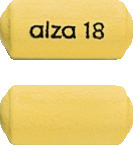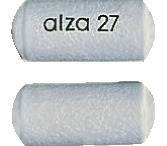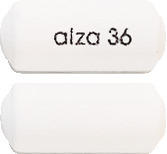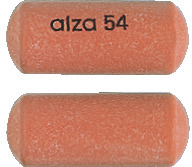What is in this leaflet
This leaflet answers some common questions about CONCERTA modified release tablets. It does not contain all the available information. It does not take the place of talking to your doctor or pharmacist.
All medicines have risks and benefits. Your doctor has weighed the risks of you or your child taking CONCERTA against the benefits this medicine is expected to have for you or your child.
If you have any concerns about taking CONCERTA ask your doctor or pharmacist.
Keep this leaflet with your medicine. You may need to read it again.
What is CONCERTA used for
CONCERTA is used to treat Attention Deficit Hyperactivity Disorder (ADHD). CONCERTA is part of a comprehensive treatment program which usually includes psychological, educational and social therapy.
CONCERTA is a stimulant that increases attention and decreases impulsiveness and hyperactivity in patients with ADHD.
CONCERTA should be used as part of a total treatment program for ADHD that may include counselling or other therapies.
CONCERTA is not recommended for use in children less than 6 years and elderly over 65 years because it has not been studied in these age groups.
CONCERTA tablets are made in an modified release form. This means that they release the active ingredient slowly. The outer layer of the CONCERTA tablet dissolves right after it is swallowed in the morning, giving an initial dose of methylphenidate hydrochloride.
The tablets have a special shell that allows the rest of the methylphenidate hydrochloride to be released from the tablet at a slow rate throughout the day.
The tablet shell does not dissolve completely after all the drug has been released and sometimes the tablet shell may be seen in your stool. This is normal.
Your doctor may have prescribed CONCERTA for another reason. Ask your doctor if you have any questions about why this medicine has been prescribed for you/your child.
CONCERTA can be abused or lead to dependence. Keep CONCERTA in a safe place to prevent misuse and abuse.
Before you take CONCERTA
When you must not take it
Do not take CONCERTA if you/your child have an allergy to:
- methylphenidate hydrochloride (the active ingredient in CONCERTA) or
- any of the other ingredients in CONCERTA. See Product Description at the end of this leaflet for a list of ingredients.
Symptoms of an allergic reaction may include: rash, itching or hives on the skin; shortness of breath, wheezing or difficulty breathing; swelling of the face, lips, tongue or other parts of the body.
Do not take CONCERTA if you/your child have any of the following medical conditions:
- glaucoma (increased pressure in the eye) which is poorly controlled
- overactive thyroid gland
- heart problems, including severe angina (chest pain), irregular heart beat, heart muscle disease
- high blood pressure (untreated or not under control)
- severe depression, anorexia nervosa, suicidal tendency or other mental illness
- phaeochromocytoma (a tumour of the adrenal gland)
Do not take CONCERTA if you/your child:
- have a history of drug or alcohol abuse
- currently taking or have taken a monoamine oxidase (MAO) inhibitor, medicines used to treat major depression (eg. phenelzine, tranylcypromine) or medicines used in Parkinson's disease (eg. selegiline) within the last 14 days
Do not use CONCERTA if the packaging is torn or shows signs of tampering.
Do not use CONCERTA beyond the expiry date (month and year) printed on the pack. If you/your child take CONCERTA after the expiry date it may not work.
Before you/your child start to take it
You must tell your doctor if you/your child:
- are/is pregnant or planning to become pregnant
- are/is breastfeeding or wish to breastfeed.
The active ingredient in CONCERTA passes into breast milk and there is a possibility that your baby may be affected. Your doctor can discuss with you the risks and benefits involved - are/is or have/has been alcohol or drug dependent
- have/has seizures or fits
- have/has heart problems
Heart-related problems including sudden death in patients who have heart problems or heart defects, stroke and heart attack in adults and increased blood pressure and heart rate have been reported with the use of methylphenidate, the active ingredient in CONCERTA. - have / had thoughts about suicide or attempted suicide
- have/has high blood pressure
- have/has aggressive behaviour or hostility
- have/has a narrowing or blockage in your digestive tract (stomach, small or large intestine)
- have tics (movements or sounds that you cannot control) or Tourette's syndrome, or a family history of these conditions
- have/has a problem with the blood vessels in your brain (such as an aneurysm)
- have/has eye problems, such as increased pressure in the eye, a condition called "glaucoma" or long-sightedness (difficulty seeing near objects)
- have/has liver or kidney problems
- have/has mental problems including psychosis, mania, bipolar illness, or depression.
Mental (psychiatric) problems may develop or get worse, including behaviour and thought problems, bipolar illness, aggressive behaviour or hostility.
Your doctor may need to adjust the dose or adapt your treatment if you/your child have any of these conditions.
If you have not told your doctor or pharmacist about any of the above, tell them before you/your child start taking CONCERTA.
Taking other medicines:
Tell your doctor or pharmacist if you/your child are taking any other medicines, including medicines you can buy without a prescription from a pharmacy, supermarket or health food shop.
In particular, tell your doctor or pharmacist if you/your child are taking any of the following:
- Monoamine oxidase (MAO) inhibitors such as phenelzine, selegiline
- medicines that increase blood pressure
- medicines used to treat depression or anxiety such as venlafaxine, sertraline, amitriptyline and imipramine
- medicines used to treat high blood pressure. CONCERTA may decrease the effectiveness of these medicines and your doctor may check your blood pressure and change your dose of antihypertensive medicine.
- medicines used for anaesthesia. CONCERTA should not be taken with certain anaesthetics on the day of the operation, as there is a chance of a sudden rise in blood pressure and heart rate during the operation. Tell your doctor if you are going to have an operation.
- medicines used to prevent seizures such as phenytoin, phenobarbitone, primidone and valproate.
- antipsychotic medicines such as olanzapine, risperidone and quetiapine used to improve the symptoms of certain types of mental illness, e.g. schizophrenia and bipolar disorder.
These medicines may be affected by CONCERTA or may affect how well CONCERTA works. Your doctor or pharmacist can tell you what to do if you/your child are taking any of these medicines.
Taking CONCERTA
Follow the directions given to you by your doctor and pharmacist. These directions may differ from the information contained in this leaflet.
How much to take:
If you/your child are currently taking other formulations of methylphenidate, your doctor will decide the best starting dose
Children and Adolescents
- The starting dose is one CONCERTA 18 mg modified release tablet in the morning
- The maximum dose is 54 mg a day taken as one dose.
Adults
- The starting dose is one CONCERTA 18 mg or 36 mg modified release tablet in the morning
- The maximum dose is 72 mg a day taken as one dose.
Follow your doctor's instructions carefully and do not change or stop your dosage without consulting your doctor first. Your doctor may adjust the amount of CONCERTA you take until it is right for you.
How to take it:
- CONCERTA should be swallowed whole with a glass of liquid. It should not be chewed, broken or crushed
- CONCERTA may be taken with or without food.
If you do not understand the instructions provided with this medicine, ask your doctor or pharmacist for help.
If you/your child forget to take it
- It may be best to wait until the following morning to take the next dose. Remember the effects of CONCERTA are designed to last approximately 12 hours from the time it is taken.
- Do not take or give your child a double dose to make up for the dose missed.
If you/your child have missed more than one dose, or are not sure what to do, check with your doctor or pharmacist.
If you have trouble remembering when to take your medicine, ask your pharmacist for some hints.
If you/your child have taken too much (overdose)
Immediately telephone your doctor or the Poisons Information Centre (telephone number 13 11 26) for advice, or go to Accident and Emergency at your nearest hospital.
Do this even if there are no signs of discomfort or poisoning. You/your child may need urgent medical attention.
If you/your child take too much CONCERTA you/your child may experience symptoms such as vomiting, agitation, muscle twitching, hallucination, dry mouth, excessive sweating, fever, headache, irregular or fast heart beat, dilated pupils, convulsions/fits, breathing problems, confusion and seizures.
While you are taking CONCERTA
Things you must do
- Always follow your doctor's instructions carefully
- Take CONCERTA exactly as your doctor has prescribed. Like all stimulants, CONCERTA may become habit-forming and can be abused by some people. If you/your child take it correctly as instructed by your doctor, abuse or dependence should not be a problem, either now or later in life
- Be sure to keep all of your doctor's appointments so that your/your child's progress can be checked
- Your doctor will want to check your/your child's blood pressure and pulse and do blood test from time to time to prevent unwanted side effects
- Tell your doctor if you/your child become pregnant while taking CONCERTA
- Parents and/or caregivers should be alert for the development of thoughts or acts of self-harm, hallucinations, abnormal thinking (psychosis) or new or worsening hostility. These were uncommon symptoms seen in clinical studies with CONCERTA and it is not known if they were caused by CONCERTA. Contact your/your child's doctor or mental health professional straight away or seek urgent medical attention if these occur
- Tell your doctor if you or your child become aggressive, anxious or agitated, or feel more aggressive, anxious or agitated than usual
- Parents and/or caregivers should contact their/their child's doctor or seek urgent treatment if they/their child develops chest pain, tightness in the chest, shortness of breath, irregular heart beat, feeling faint or loss of consciousness while taking CONCERTA
- Tell your doctor if you or your child develop severe headaches, weakness or paralysis of any body part, or develop problems with coordination, vision, speaking, finding words or with your memory
- Children should have their height and weight checked regularly as CONCERTA may slow children's rate of growth
- Tell your doctor if you/your child experience numbness, tingling and a changing colour of the fingers and toes when cold (‘Raynaud’s phenomenon’)
- Tell your doctor if you or your child develop prolonged and painful erections, seek immediate medical attention
- Tell your doctor if you/your child are about to start taking a new medicine, that you/your child are taking CONCERTA
Things you must not do
- Do not use CONCERTA to treat any other complaint unless your doctor says so.
- Do not give this medicine to anyone else, even if their symptoms seem similar.
- Do not stop treatment without first checking with your doctor.
If you/your child suddenly stop taking this medicine, you/your child's condition may reappear or you/your child may get unwanted effects such as depression. Your doctor may want to gradually reduce the amount of medicine taken each day before stopping it completely.
Things to be careful of
- CONCERTA may impair your ability to operate potentially hazardous machinery or vehicles. You should exercise caution until you are reasonably certain how you react to CONCERTA before you drive a car, operate machinery, or do anything else that could be dangerous.
Side Effects
All medicines can have side effects. Sometimes they are serious, most of the time they are not. You/your child may need medical treatment if you get some side effects. Do not be alarmed by this list of possible side effects. You/your child may not experience any of them.
Ask your doctor or pharmacist to answer any questions you may have. Tell your doctor if you/your child experience any of the following and they worry you:
stomach or bowel problems such as:
- loss of appetite
- stomach pain
- nausea
- vomiting
- dry mouth
- indigestion
- constipation
- weight loss
- diarrhoea
difficulty thinking or working because of:
- headache
- trouble sleeping
- dizziness
throat or lung infections such as:
- cold
- cough
- sore throat and hoarse/ loss of voice
- feeling of tension or fullness in the nose, cheeks and behind your eyes, sometimes with a throbbing ache, fever, stuffy nose and loss of the sense of smell
joints or movement changes such as:
- painful and/ or swollen joints
- aching muscles, muscle tightness, spasm, tenderness or weakness, not caused by exercise
- difficulty opening the mouth
- clenching or grinding the teeth
other changes such as:
- decreased sex drive or difficulty getting and keeping an erection
- feeling very tired or weak
- excessive thirst
- feeling sleepy
- loss of bladder control
Tell your doctor immediately if you notice any of the following behavioural changes such as:
- aggression
- confusion
- disorientation
- seeing, feeling or hearing things that are not there
- mood swings, overexcitement over-activity and uninhibited behaviour
- feeling depressed
- feeling tense
- nervousness or anxiety
- brief periods of acute anxiety where symptoms suddenly and usually include difficulty breathing, chest pains, fast heart rate, dizziness and lightheadedness, sweating, trembling and faintness
- restlessness
- agitation and irritability
- movements or sounds that you cannot control (tics)
- obsessive-compulsive disorder (OCD) (including irresistible urge to pull out body hair, having repeated unwanted thoughts, feelings, images, or urges in your mind (obsessive thoughts), performing repeated behaviours or mental rituals (compulsions))
nervous system changes such as:
- convulsions, fits or seizures
- muscle twitching or tremor
- numbness and tingling feeling in fingers and toes
reproductive system changes such as:
- prolonged and painful erections
- enlarged breasts in boys or men
changes in your sight, namely:
- visual disturbance
- blurred or double vision
- dilated pupils
changes to the skin or hair such as:
- unusual hair loss or thinning of the hair
- redness of the skin
- excessive sweating
- signs of allergy such rash, itching or hives on the skin; shortness of breath, wheezing or difficulty breathing; swelling of the face, lips, tongue or other parts of the body
body temperature changes such as:
- fever
- hot flushes
heart or blood problems such as:
- fast or abnormal heart beat
- increased blood pressure
- chest pain
- chest discomfort
- low white blood cell count
- low platelet count
other side effects such as:
- shortness of breath
- nose bleeds
- slowing of growth (height and weight) in children
- blockage of the oesophagus, stomach, small or large intestine in patients who already have a narrowing in any of these organs
- increased levels of the liver enzyme ALT
Other side effects not listed above may also occur in some people. Tell your doctor if you notice any other effects.
After using CONCERTA
Storage
Keep the tablets in the bottle until it is time to take them.
Store CONCERTA in a cool dry place where the temperature is below 25°C. Keep the container tightly closed.
Keep medicines where children cannot reach them. A locked cupboard at least one-and-a-half metres (1.5 m) above the ground is a good place to store medicines.
Do not store CONCERTA, or any other medicine, in the bathroom or near a sink. Do not leave medicines in the car or on windowsills. Heat and dampness can destroy some medicines.
Disposal
If your doctor tells you/your child to stop taking CONCERTA modified release tablets or the medicine has passed its expiry date, ask your pharmacist what to do with any medicine that may be left over.
Product Description
What it looks like
CONCERTA 18 mg are yellow capsule-shaped tablets, with "alza 18" printed in black ink on one side [AUST R 93862].
CONCERTA 27 mg are grey capsule-shaped tablets, with "alza 27" printed in black ink on one side [AUST R 124502].
CONCERTA 36 mg are white capsule-shaped tablets, with "alza 36" printed in black ink on one side [AUST R 93863].
CONCERTA 54 mg are brownish-red capsule-shaped tablets, with "alza 54" printed in black ink on one side [AUST R 93864].
CONCERTA products are supplied in bottles of 28, 30, 56, 60 or 100 tablets.
Not all pack sizes are marketed.
Ingredients
Each CONCERTA modified release tablet contains 18 mg, 27 mg, 36 mg or 54 mg of methylphenidate hydrochloride as the active ingredient.
CONCERTA modified release tablets contain lactose monohydrate.
Each tablet also contains the following other ingredients:
- butylated hydroxytoluene
- carnauba wax
- cellulose acetate
- hypromellose
- phosphoric acid
- poloxamer
- polyethylene oxide
- povidone
- sodium chloride
- stearic acid
- succinic acid
- iron oxide black
- iron oxide yellow
- iron oxide red (27 mg & 54 mg tabs only)
- OPACODE WB monograming ink NS-78-17715 Black (PI 4424)
- OPADRY complete film coating system YS-1-19025-A Clear (PI 4421)
- The 18 mg tablet also contains Opadry II yellow YS-30-12788-A
- The 27 mg tablet also contains Opadry II grey Y-30-17528
- The 36 mg tablet also contains Opadry II white Y-30-18037
- The 54 mg tablet also contains Opadry II red Y-30-15567-A.
Sponsor
JANSSEN-CILAG Pty Ltd
1-5 Khartoum Road
Macquarie Park NSW 2113 Australia
Telephone: 1800 226 334
This leaflet was prepared in July 2024.
Published by MIMS September 2024





 Clinical judgement should be used when selecting the dose for patients currently taking methylphenidate in other regimens. If improvement is not observed after appropriate dosage adjustments over a one month period, the drug should be discontinued.
Clinical judgement should be used when selecting the dose for patients currently taking methylphenidate in other regimens. If improvement is not observed after appropriate dosage adjustments over a one month period, the drug should be discontinued. The majority of AEs were mild to moderate in severity.
The majority of AEs were mild to moderate in severity. The majority of AEs were mild to moderate in severity.
The majority of AEs were mild to moderate in severity. The majority of ADRs were mild to moderate in severity.
The majority of ADRs were mild to moderate in severity. The majority of ADRs were mild to moderate in severity.
The majority of ADRs were mild to moderate in severity. Adverse events reported since market introduction in patients taking methylphenidate include suicide, suicide attempt and suicide ideation. No causal relationship between methylphenidate and these events have been established.
Adverse events reported since market introduction in patients taking methylphenidate include suicide, suicide attempt and suicide ideation. No causal relationship between methylphenidate and these events have been established. C14H19NO2.HCl.
C14H19NO2.HCl.